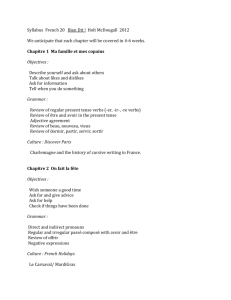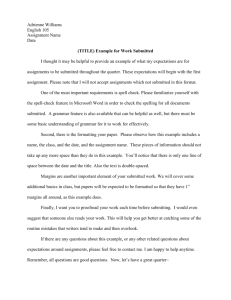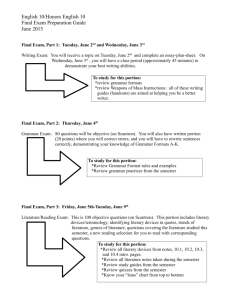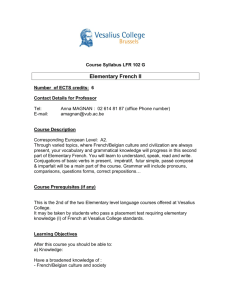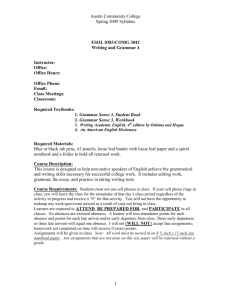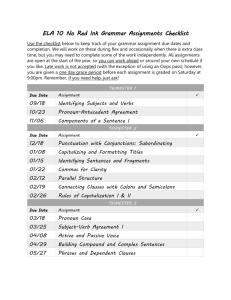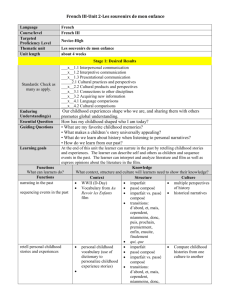Click here for the course syllabus
advertisement
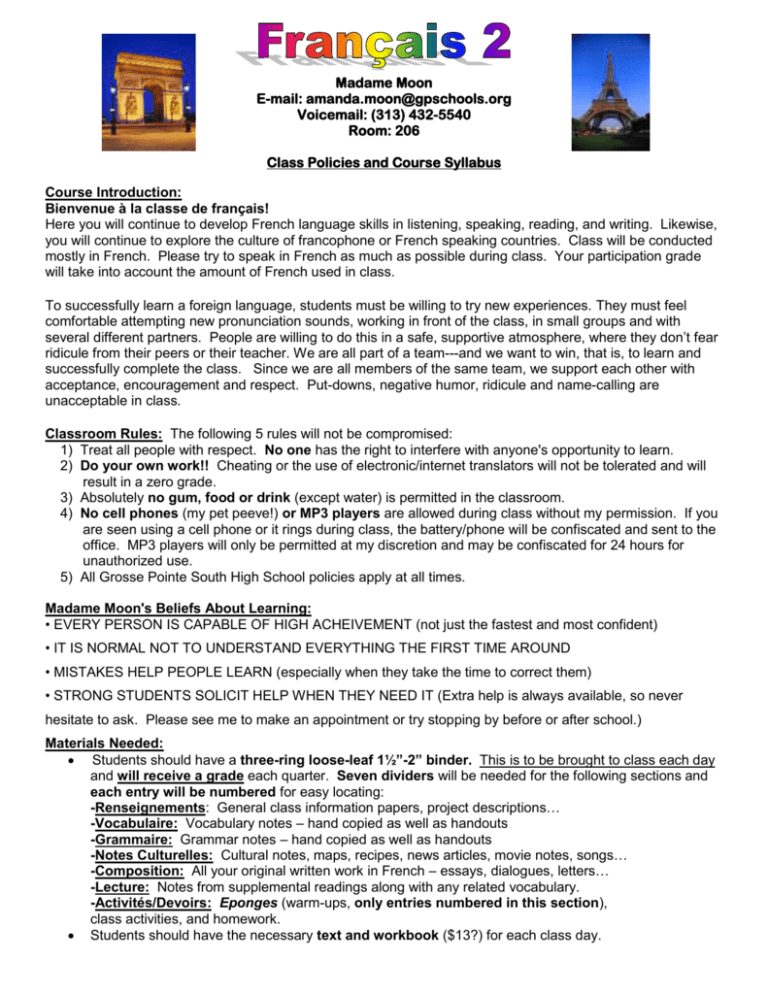
Madame Moon E-mail: amanda.moon@gpschools.org Voicemail: (313) 432-5540 Room: 206 Class Policies and Course Syllabus Course Introduction: Bienvenue à la classe de français! Here you will continue to develop French language skills in listening, speaking, reading, and writing. Likewise, you will continue to explore the culture of francophone or French speaking countries. Class will be conducted mostly in French. Please try to speak in French as much as possible during class. Your participation grade will take into account the amount of French used in class. To successfully learn a foreign language, students must be willing to try new experiences. They must feel comfortable attempting new pronunciation sounds, working in front of the class, in small groups and with several different partners. People are willing to do this in a safe, supportive atmosphere, where they don’t fear ridicule from their peers or their teacher. We are all part of a team---and we want to win, that is, to learn and successfully complete the class. Since we are all members of the same team, we support each other with acceptance, encouragement and respect. Put-downs, negative humor, ridicule and name-calling are unacceptable in class. Classroom Rules: The following 5 rules will not be compromised: 1) Treat all people with respect. No one has the right to interfere with anyone's opportunity to learn. 2) Do your own work!! Cheating or the use of electronic/internet translators will not be tolerated and will result in a zero grade. 3) Absolutely no gum, food or drink (except water) is permitted in the classroom. 4) No cell phones (my pet peeve!) or MP3 players are allowed during class without my permission. If you are seen using a cell phone or it rings during class, the battery/phone will be confiscated and sent to the office. MP3 players will only be permitted at my discretion and may be confiscated for 24 hours for unauthorized use. 5) All Grosse Pointe South High School policies apply at all times. Madame Moon's Beliefs About Learning: • EVERY PERSON IS CAPABLE OF HIGH ACHEIVEMENT (not just the fastest and most confident) • IT IS NORMAL NOT TO UNDERSTAND EVERYTHING THE FIRST TIME AROUND • MISTAKES HELP PEOPLE LEARN (especially when they take the time to correct them) • STRONG STUDENTS SOLICIT HELP WHEN THEY NEED IT (Extra help is always available, so never hesitate to ask. Please see me to make an appointment or try stopping by before or after school.) Materials Needed: Students should have a three-ring loose-leaf 1½”-2” binder. This is to be brought to class each day and will receive a grade each quarter. Seven dividers will be needed for the following sections and each entry will be numbered for easy locating: -Renseignements: General class information papers, project descriptions… -Vocabulaire: Vocabulary notes – hand copied as well as handouts -Grammaire: Grammar notes – hand copied as well as handouts -Notes Culturelles: Cultural notes, maps, recipes, news articles, movie notes, songs… -Composition: All your original written work in French – essays, dialogues, letters… -Lecture: Notes from supplemental readings along with any related vocabulary. -Activités/Devoirs: Eponges (warm-ups, only entries numbered in this section), class activities, and homework. Students should have the necessary text and workbook ($13?) for each class day. The Word Reference app or a French-English dictionary (for home) is highly recommended. A supply of loose-leaf lined paper will be needed for daily notes and assignments. Students should bring a pen and pencil to class each day. Homework: Homework is assigned approximately 3-5 times per week. Homework assignments are usually awarded points based upon timeliness and seriousness of completion. Only completed assignments will receive full credit, otherwise half credit for half effort/completion. Homework will be checked when it is due and some assignments will be collected for more thorough grading. Assignments are due at the beginning of class. Assignments that are submitted after the beginning of class are considered late. Late homework is accepted for half-credit the next day, and no credit thereafter. Two homework passes per semester will be given to each student each semester. A homework pass may be used to receive full credit on a one-day late homework assignment. It is the student's responsibility to show the completed assignment by the very next day to receive full credit. Homework will not be done in class during other activities! Euros: You will be awarded with Euros for some of your participation during class. They will be applied to your participation score (must have a minimum of 5-7/quarter - TBA). The remaining Euros will be applied as extra credit and may raise your grade a maximum of one step (i.e. B+ A-). Absences: All missed work must be made-up. This includes Eponges (warm-ups) and notes taken in class. It is the student’s responsibility to obtain, complete and submit the missed assignments (see class website calendar). All handouts are available in the course binder at the front of the classroom and note handouts are available online. Students will be given one day to makeup homework and two days for tests and quizzes for each excused absence. When returning from an absence, it is the student’s responsibility to make arrangements to make-up a test or quiz missed with the teacher. If you are absent on a review day, you may choose to test with your class or to take the test the very next day. Make-up tests/quizzes are not given during regular class time. You must make arrangements for before/after school, at lunch or tutorial. The policy stated here includes absences because of field trips and athletic obligations. Tardies: To be considered on time, students must be ready to work when the bell rings. Excessive tardiness will result in a call home and an office referral thereafter. Grading: For each chapter students are expected to take a minimum of one quiz and one summative chapter test. There will be at least one project per semester. Grades are assigned on a straight-point system. Each two marking periods will account for 40% of the final grade. The exam grade will account for 20% of the final semester grade. The following grading scale will be used in determining letter grades. A+ = 98%+ B+ = 87%-89% C+ = 77%-79% D+ = 67%-69% A = 93%-97% B = 83%-86% C = 73%-76% D = 63%-66% A- = 90%-92% B- = 80%-82% C- = 70%-72% D- = 60%-62% Remind 101: In the event that I need to communicate a change in assignment or other important information outside of class time, please be sure to join the text message group by texting to 81010 the code @gpfrench2. This will only be used on an as-needed basis and will not be a daily/weekly reminder system. *** “Together we have read and discussed the policies and syllabus for this class.” Student signature_____________________________________________ Parent/Guardian signature_____________________________________ Course Content Overview: During the first semester, we will complete the first five chapters of the Allez, viens! textbook. Semester two will cover the following five chapters of the book. We will spend approximately three weeks on each chapter. You will be quizzed and tested on each chapter and occasional projects may be assigned. Semester 1 Bon séjour! Chapter 1 Grammar: Avoir, Être, adjectives, Quel, -IR verbs (Present, Past, Imperative), Near Future (Aller + infinitive) Vocabulary: Clothing, Making Suggestions Culture: Paris and Surrounding Area (Ile de la Cité, Versailles, Chartres, Giverny, etc.), Travel Documents, Diversity of restaurants in French cities. Bienvenue à Chartres! Chapter 2 Grammar: Tu/Vous, Questions with est-ce que, Past Tense, Adjectives preceding the noun (BAGS), Contractions with à, Aller Vocabulary: House, Places in a town or city Culture: Visiting a French home, Differences between French, Quebecois & American homes, accepting a compliment, Notre-Dame de Chartres cathedral Un repas à la française Chapter 3 Grammar: Object pronoun en, Contractions with De, Partitive, Lui and leur Vocabulary: Food and Shops, Courses in a meal, Thanksgiving, Well wishes Culture: Shopping at specialty shops, French meals, table etiquette, euros, Special occasions, Noël A la Martinique! Chapter 4 Vocabulary: Island vegetation and places, directions, island activities, reflexive verbs, Grooming routines, relating a series of events Grammar: Comparisons, de instead of des for plural nouns with preceding adjectives, Ce que, Ce qui, Infinitives and present tenses of reflexive verbs, adverbs of frequency Culture: Fort-de-France, Saint-Pierre, Mount Pelée, Yoles rondes or gommiers (fishing boats), créole, dialect differences, Carnival, Mardi Gras, Island music (Zouk, beguine, mazurka) En Touraine! Chapter 5 Grammar: Passé Composé (Regular and Irregular with Avoir), Passé Composé with Être Culture: Carnet de correspondance, La cantine, lunch, Report cards in France, assessments, grades Vocabulary: Expressing satisfaction and frustration, consoling someone, Giving excuses, congratulating and reprimanding someone Semester 2 A nous les châteaux! Chapter 6 Vocabulary: Site-seeing, Expressing enthusiasm, indifference, and dissatisfaction, Disbelief and doubt, Asking for and giving information Grammar: Review of past tense and introduction of imperfect tense (être), Passé Composé with être (House or Dr & Mrs. Vandertramp), Informal v. Formal questions, Present tense of ouvrir Culture: Châteaux forts, Châteaux de la Renaissance, TGV, le car, le train, gare routière En pleine forme. Chapter 7 Vocabulary: Expressing concern and complaining, body parts, Getting in shape, accepting, rejecting, and giving advice, expressing discouragement and offering encouragement, Healthy eating, advising what one should and should not do Grammar: Contractions with à, Passé Composé with reflexive verbs, Present and past tense of devoir, pronoun en, adverbs of frequency, Present and past of me nourir Culture: Pharmacies in France, Figurative expressions, MJC, Gymnase Club, sports outside of high school, Water En Côte d’Ivoire! Chapter 8 Grammar: Adjectives, Imparfait of avoir and être, Imparfait of other verbs, Making suggestions using Si on+imparfait…? Culture: African names, Everyday life, High school in Côte d’Ivoire, Félix Houphouët-Boigny, la basilique NotreDame-de-la-Paix, Abidjan “melting pot” of Africa Vocabulary: Reminiscing, Market in Abidjan Provence- Tu connais la nouvelle? Chapter 9 Grammar: Avoir l’air + adjective, the passé compose vs. l’imparfait, using the imperfect as background with interrupting actions (the later are passé compose), etre en train de + l’imparfait Vocabulary: wondering what happened, offering explanations, breaking news, showing interest, accepting/rejecting explanations, beginning, continuing and ending a story Je peux te parler? Chapter 10 Grammar: Object pronouns and their placement, direct object pronouns and the passé composé, object pronoun placement with infinitives Vocabulary: sharing a confidence, asking for and giving advice, asking for and granting a favor, making excuses, apologizing, accepting an apology and reproaching someone
